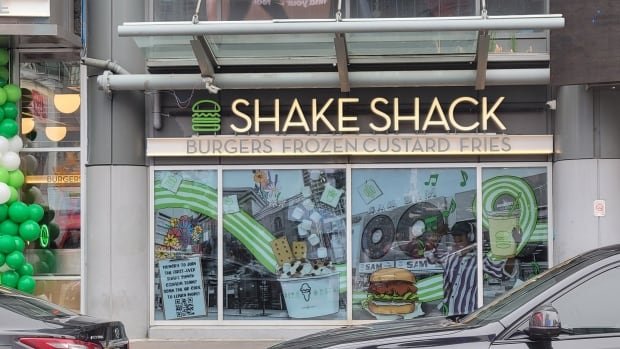If you fancy a burger and crinkle-cut fries, U.S. fast-casual joint Shake Shack is dipping a toe into the Canadian market — but its success could depend on customers willing to fork out higher prices.
The chain is starting with a lone Toronto location, which opens Thursday, with plans to expand across Canada with 35 locations by 2025.
“Canada’s been on our radar for about eight years or so,” said Michael Kark, president of global licensing at Shake Shack, in an interview with CBC News.
He noted that Shake Shack first tested Canadian waters in 2017 with a pop-up, but said the chain was taking its time with an entry here until it found the right local partners. Toronto-based businesses, like chocolatier ChocoSol and bakery Brodflour, are among its local suppliers.
“We didn’t want to follow those who have come in and treated [Canada] like the 51st state,” he said.

The company was initially conceived in New York in 2001 as a high-end hot dog cart before it opened its first restaurant in 2010. It now has over 500 locations worldwide.
There’s no denying that Shake Shack is selling a slightly pricier burger — its signature ShackBurger goes for $8.49, or $12.49 for a double patty.
Kark said the higher costs are in part due to Shake Shack sourcing some of its ingredients locally. That also makes it stand out from other chains — it’s “more like a fine-dining restaurant than a quick-serve restaurant.”
The company will serve a handful of items unique to its Toronto location, like a maple salted pretzel shake, and it will also diverge from other fast-casual joints by serving Ontario wine and local beer from Toronto-based Bellwoods Brewery.
“We think that we can deliver an experience,” said Kark.
A U.S. burger joint in Canada requires ‘good planning’: analyst
Canada has been a hot ticket for premium casual restaurants like Blaze Pizza, Chick-fil-A, Chipotle and now Shake Shack, according to Robert Carter, an industry analyst with the StratonHunter Group.
Restaurants in that quick-service category represent about $40 billion to $50 billion of the $90-billion restaurant market in Canada, which is otherwise dominated by major fast-food chains like McDonald’s.
“In times of economic uncertainty, there’s some shifting going on,” said Carter. “Maybe people aren’t going out to the higher-end restaurants as much, but the quick service does quite well.”
Still, Canada has seen some colossal failures.
Asian fusion restaurant P.F. Chang’s is popular in the U.S., but its few locations in Canada “unfortunately failed miserably,” said Carter — partly due to a lack of demand for such a chain in a diverse market where smaller restaurants specialize in ethnic cuisines. And several Carl’s Jr. locations have closed across Canada in recent years due to issues with franchisees.
The key to running a successful U.S. chain in Canada, said Carter, comes down to a strong understanding of the market.
“It requires good planning, and requires [a] good Canadian partner to help identify and make sure that you understand the market.”
Shake Shack is working with Canadian private investment firms Harlo Entertainment and Osmington, which Kark said has made the chain’s entrance into Canada “quite smooth.”

Carter noted that most restaurants are reluctant to pass higher costs onto their customers — instead, brands will introduce various discounts to drive traffic while still offering a deal.
That dynamic is playing out in the U.S. right now, as McDonald’s, Burger King and Wendy’s offer similarly packaged deals in the $3 to $5 US range. CBC News reached out to several chains to see if similar deals were offered in Canada; Wendy’s was the lone chain to offer a $5 breakfast deal.
“This is truly a pass-through from the actual costs of food, the cost of labour, the cost of rent. So it’s becoming a much more difficult environment to be successful.”
Shake Shack is also hoping to stand out by offering alcohol. But as Carter notes, Canadian consumers are drinking less and alcohol sales by volume have been on the decline in Canada, having slipped by 1.1 per cent in 2022-23 for the second consecutive year, according to Statistics Canada.
What does that mean for Shake Shack? “I think they’ll quickly realize that it does not need to be a fundamental part of their business model,” he said, noting that younger customers are more interested in “fancy drinks,” like the custard milkshakes that it offers.
The chain’s plan to open about 35 stores across the country won’t have much of an impact on other established brands, Carter said.
“It’ll be more some of the mom-and-pop independent burger places that may feel some of the pinch.”

Leave a Reply